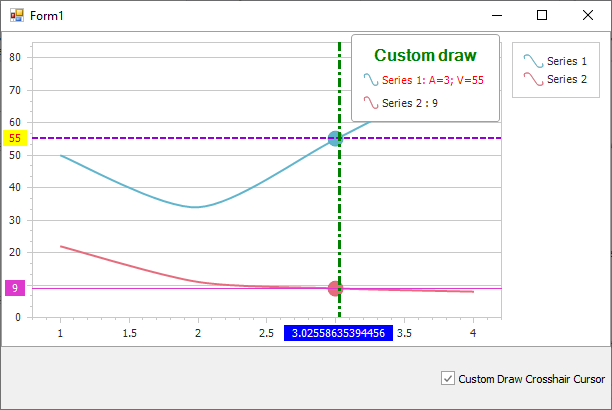BaseCrosshairLabelElement.Visible Property
Specifies whether the crosshair label element is visible when custom drawing a crosshair cursor.
Namespace: DevExpress.XtraCharts
Assembly: DevExpress.XtraCharts.v25.2.dll
NuGet Package: DevExpress.Charts
Declaration
Property Value
| Type | Description |
|---|---|
| Boolean | true, if the crosshair label element is visible; otherwise, false. |
Remarks
Use the Visible property when custom drawing a crosshair specific label element (a crosshair axis label, crosshair group header element or crosshair common label) from the ChartControl.CustomDrawCrosshair event handler.
Before using the Visible property, make sure the ChartControl.CrosshairEnabled property is set to true.
For more information, refer to Tooltip and Crosshair Cursor.
Example
This example shows how to use the ChartControl.CustomDrawCrosshair event to create a custom appearance for the crosshair cursor. This event is invoked when you select the Custom Draw Crosshair Cursor check box.

If you wish to display crosshair axis lines and labels on a chart before custom drawing the crosshair cursor, set the CrosshairOptions.ShowArgumentLine, CrosshairOptions.ShowArgumentLabels, CrosshairOptions.ShowValueLabels and CrosshairOptions.ShowValueLine properties to true.
Note that the crosshair cursor customization is available for the CrosshairOptions.SnapMode property set to NearestArgument.
using System;
using System.Drawing;
using System.Windows.Forms;
using DevExpress.Drawing;
using DevExpress.XtraCharts;
namespace CustomDrawCrosshairCursor {
public partial class Form1 : Form {
public Form1() {
InitializeComponent();
}
private void OnCheckEditCheckedChanged(object sender, EventArgs e) {
if (checkEdit1.Checked)
chartControl1.CustomDrawCrosshair += OnChartControlCustomDrawCrosshair;
else
chartControl1.CustomDrawCrosshair -= OnChartControlCustomDrawCrosshair;
}
private void OnChartControlCustomDrawCrosshair(object sender, CustomDrawCrosshairEventArgs e) {
// Specify the crosshair argument line color, dash style and thickness.
e.CrosshairLineElement.Color = Color.Green;
e.CrosshairLineElement.LineStyle.DashStyle = DashStyle.DashDot;
e.CrosshairLineElement.LineStyle.Thickness = 3;
// Specify the back color for the crosshair argument axis label.
foreach (CrosshairAxisLabelElement axisLabelElement in e.CrosshairAxisLabelElements)
axisLabelElement.BackColor = Color.Blue;
foreach (CrosshairElementGroup group in e.CrosshairElementGroups) {
CrosshairGroupHeaderElement groupHeaderElement = group.HeaderElement;
// Specify the text, text color and font for the crosshair group header element.
groupHeaderElement.Text = "Custom draw";
groupHeaderElement.TextColor = Color.Green;
groupHeaderElement.DXFont = new DXFont("SegoeUI", 12, DXFontStyle.Bold);
// Obtain the first series.
CrosshairElement element = group.CrosshairElements[0];
// Specify the color, dash style and thickness for the crosshair value lines.
element.LineElement.Color = Color.DarkViolet;
element.LineElement.LineStyle.DashStyle = DashStyle.Dash;
element.LineElement.LineStyle.Thickness = 2;
// Specify the text color and back color for the crosshair value labels.
element.AxisLabelElement.TextColor = Color.Red;
element.AxisLabelElement.BackColor = Color.Yellow;
// Format the text shown for the series in the crosshair cursor label. Specify the text color and marker size.
element.LabelElement.TextColor = Color.Red;
element.LabelElement.MarkerSize = new Size(15, 15);
element.LabelElement.Text = string.Format("{0}: A={1}; V={2}", element.Series.Name, element.SeriesPoint.Argument, element.SeriesPoint.Values[0]);
}
}
}
}